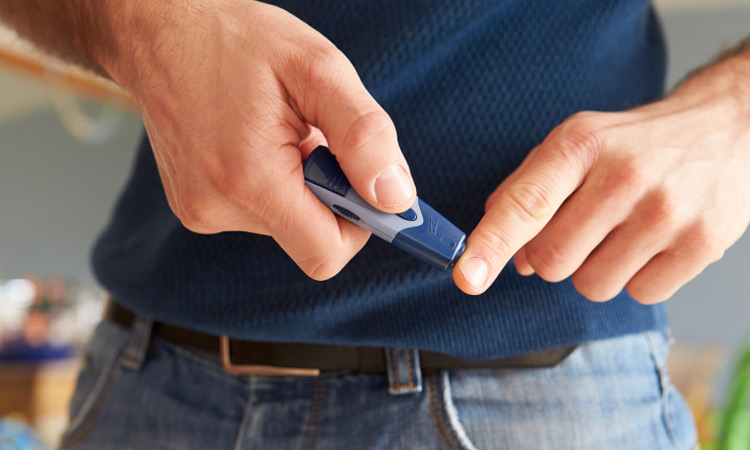 According to the Centers for Disease Control and Prevention, almost 10% of the citizens of the United States have diabetes. Of the nearly 30 million sufferers, one in four don’t realize that they even have the disease. It should come as no surprise that diabetes strikes more commonly after the age of 45. For men, this is especially alarming as they account for the quickest growing segment of those who contract Type 2 diabetes, which can lead to blindness or amputation.
According to the Centers for Disease Control and Prevention, almost 10% of the citizens of the United States have diabetes. Of the nearly 30 million sufferers, one in four don’t realize that they even have the disease. It should come as no surprise that diabetes strikes more commonly after the age of 45. For men, this is especially alarming as they account for the quickest growing segment of those who contract Type 2 diabetes, which can lead to blindness or amputation.
Diabetes occurs when the body cannot properly control the glucose levels in the blood. In a healthy body, the digestive tract breaks down foods into glucose, which is released into the bloodstream. The pancreas produces insulin to stimulate the cells to absorb the glucose and use it as energy. For people with Type 2 diabetes, the tissues of the body become resistant to insulin. As a result, the pancreas responds by producing greater amounts of insulin, but this is unsustainable and over time the blood sugar levels rise. High blood sugar levels can cause damage to blood vessels and nerves, leading to kidney disease, stroke, heart disease and other circulatory related diseases.
The warning signs of diabetes are many but the most common are increased thirst, fatigue, blurred vision and frequent urination, which can affect men and women. However, diabetes can affect men and women differently. Recent research indicates that diabetes can damage DNA. According to research fellow in Reproductive Medicine Research Group at Queen’s University, Belfast, Dr Ishola Agbaje, “Increased DNA fragmentation of nuclear DNA and mitochondrial DNA deletions in sperm from diabetic men…may have implications for fertility.”
Diabetes is also a contributing factor to an increased risk of developing atherosclerosis. Research published in the Journal of Clinical Endocrinology & Metabolism indicates that men with Type 2 diabetes and low testosterone face a bigger risk. According to study author, Javier Mauricio Farias, MD of the Hospital Universitario Sanatorio Guemes in Buenos Aires, Argentina, the results of the study “advance our understanding of the interplay between low testosterone and cardiovascular disease in patients with diabetes.”
In spite of all the additional risks men face, according to CDC data they are 80 percent less likely to use a regular source of health care compared to women. Research has documented that up to 50% of men aged between 18 and 50 don’t even have a regular health care provider. Why would men avoid care, especially relating to diabetes? Diabetes can trigger erectile dysfunction, which men are notoriously uneasy discussing. Most research indicates that up to 75% of men with diabetes develop some form of erectile dysfunction.
How does this happen? High blood sugar causes nerve and blood vessel damage that affect a variety of processes in the body. Sexual response is only one of these as the damage to blood vessels causes a block in the release of nitric oxide. Nitric oxide is a chemical that creates a reaction signalling the body to relax and let in blood flow. A lack of nitric oxide means that the blood vessels are constricted and blood flow is reduced to the penis. Fortunately, careful management of blood sugar levels can reduce the risk of erectile dysfunction and correct many of the symptoms.
Diabetes can be a terrible diagnosis to face, but treatment is available. First, if you’re overweight, obese, live a sedentary lifestyle and partake in a diet that is high in sugar and processed carbohydrates, you’re an easy target. Slash your risk by changing your diet and making steps to be more active. If your family has a history of diabetes, diet and exercise alone may not be enough. If you can’t fend off the disease before it strikes, your best bet is to stay as proactive on the treatment as possible. Visit your doctor regularly, look for symptoms and be diligent with checking your blood sugar levels and necessary insulin injections.
Diabetes does not have to be what defines you. Instead, it should act as a wake up call to change your life, live healthier and take a more active role in your medical care.
Click here to find out about Rose’s thoughts on wellbeing and health



1 Comment
Kristin
I’m definitely giving this article to my husband, so important to keep in mind. I always worry when he isn’t taking care of himself. Thanks